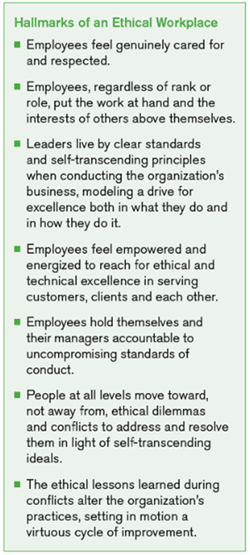We’ve officially kicked off the New Year, so happy 2014!
With the New Year comes the tradition of resolutions, which we hear a lot about in these first few weeks of the year.
I’ll be honest — I’m not so big on New Year’s Resolutions, but I do think there’s value in paying close attention to the questions that resolutions stem from, like “what can I do to better my business/life/relationships?”
I prefer to call it continuous self-improvement because it’s likely that many of these resolutions are things we should always be aiming to improve, and not just in the space of one defined year.
Why ethical business makes financial sense
In the spirit of the tradition though, I’ll pose this to you: if you were to make one resolution this year that would impact the lives of your employees and the financial performance of your organization, what would it be?
My answer: be an ethical business.
This is the most fundamental attribute of a great workplace, the foundation that must exist to build all other important parts of a great workplace. And while it might seem the obvious thing to aim for, nearly HALF of all U.S. employees report witnessing unethical or illegal conduct in their workplace each year (according to a 2013 Effective Practice Guideline’s report from the SHRM Foundation) with the majority of these events going unreported and unaddressed!
Be an ethical workplace because this statistic is alarmingly high; be an ethical workplace because good ethics = good business. The SHRM Foundation’s report explains that an organization’s culture is the strongest predictor of how much market value that firm will create for every dollar invested by shareholders.
In fact, the stock price growth of the 100 most ethical firms (based on the most widely used measure of ethical workplace culture) outperformed stock market and peer indices by nearly 300 percent. Looking from 1998-2011 the annualized returns of Fortune’s “100 Best Companies to Work For” in the United States were 11.06 percent versus 4.36 percent for the Russell 3000 and 3.38 percent for the S&P 500.
There’s a flip side to this too, though. If good ethics = good business, then bad ethics = bad business, and in a BIG way.
It’s the right thing to do
More than 50 percent of the largest corporate bankruptcies have happened due to unethical business practices. And what was the cost of these bankruptcies to owners and the economy? $1.228 trillion, or, as the EPG reveals, nearly 10 percent of the U.S gross domestic product in 2011!
Now, I don’t disregard that many of the statistics we see on a daily basis fall into a kind of grey area. It’s likely we’re aware of the many variables that affect their legitimacy, like intent of the company producing the report or maybe the lack of a wide enough demographic representation, and so we use them more as guiding than supporting evidence.
The statistics on ethical business though, seem pretty black and white to me.
I’ll say it one more time: Be an ethical workplace. Be an ethical workplace because the statistic that almost 50 percent of employees witness unethical behavior each year is alarmingly high. Be an ethical workplace because good ethics = good business.
Be an ethical workplace because it’s a New Year and it’s a resolution to always have; but most importantly, be an ethical business because it’s the right thing to do.
This originally appeared on China Gorman’s blog at ChinaGorman.com.
